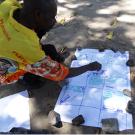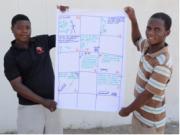Phipps Campira (Mozambique), Zipo Akinyi (Kenya/New Zealand), and Lenneke Knoop (The Netherlands) have been working for the past two months on a project in the community of Mezimbite, Mozambique. 566 households (3,400 people) are frequently suffering from constant famine caused by poor agricultural production capacity, a lack of knowledge improved agricultural practices and climate change related unpredictable rain and extreme weather events.
Famine takes away healthy live years from members of the community and can lead to food insecurity and malnutrition thereby reducing overall productivity, well-being, and social status. When children are under-nourished this will lead to a disturbed development, affected school participation, which could lead to a vicious circle. Malnourished and diseased community members are unable to produce sufficient food and income for themselves and to lead the productive, meaningful, prosperous lives they need to leave the cycle of poverty and contribute to the development of their communities.
| Participatory Needs Assessment |
|
 |
After conducting a participatory needs assessment with the community members of Mezimbite the team developed this project outline to increase crop production, reduce malnutrition and improve food security and reduced mortality rates among children and the community. |
|
Their simple project outline: [Problem 1]. Chronic famine among the community. [Problem 2]. A high mortality rate among the children in the community. Advocacy program for Government or NGO Health Centre [Solution to underlying cause: Lack of health post and health facilities within or near the community]: |
|
| Project Goals: | |||
 |
|
||
| You can download the participatory needs assessment here: OL 341 Assignment One. You can download their full project outline here: You can download their scientific research on activity effectiveness here: Background research: Community-directed interventions for integrated delivery of a health package against major health problems in rural Uganda: perceptions on the strategy and its effectiveness.(Ndyomugyenyi & Kabali, 2010) In a study conducted in Uganda aimed to examine community perceptions on Community Directed Interventions (CDI) strategy and its effectiveness for integrated delivery of health interventions with different degrees of complexity (insecticide treated nets, vitamin A supplements to children, home management of malaria and direct observation treatment of tuberculosis), using community-directed treatment with ivermectin (CDTI) as an entry point, compared to conventional delivery channels. The interventions were implemented in an incremental manner and both qualitative and quantitative methods were used at evaluation, three years after implementation. Coverage was significantly higher in CDI arm, compared to conventional delivery channels for all interventions (P < 0.05), except for direct observation treatment of tuberculosis (P > 0.05). Community members expressed interest in CDI because it responds to their perceived health problems, actively engages them and improves access to health care services. Community led advocacy groups are better placed to advocate for the community’s needs and therefore influence the development, reach, implementation and oversight of public systems and policies. It also ensures full community participation increasing the likelihood of intervention uptake by the community. |
|||
Would you like to learn how to develop Community Based Adaptation Projects?
Please write us with your stories, thoughts and comments through Online.Learning@csd-i.org
